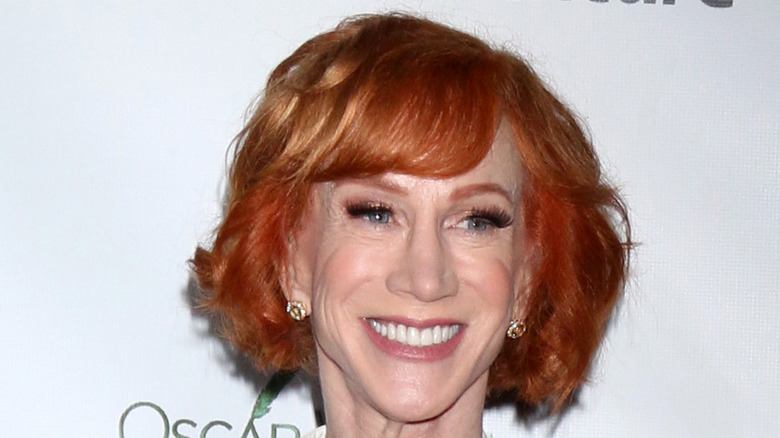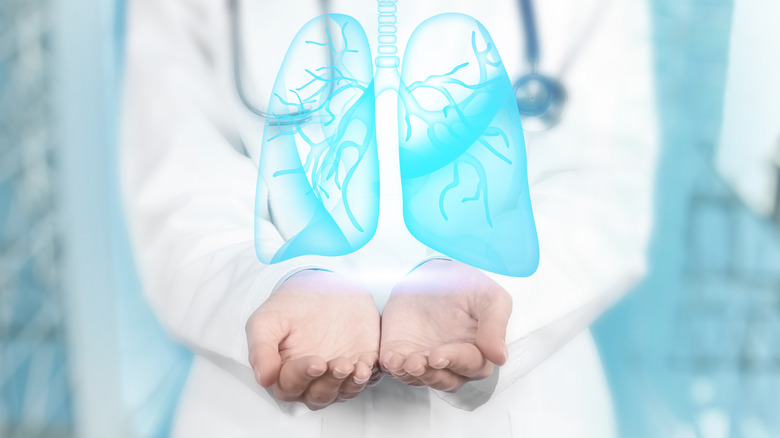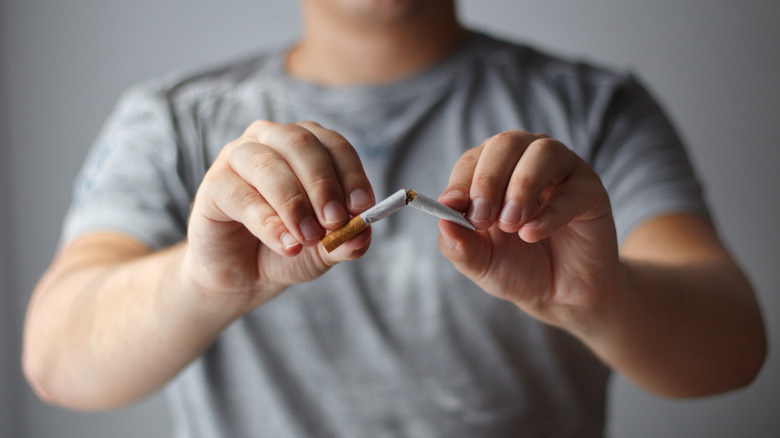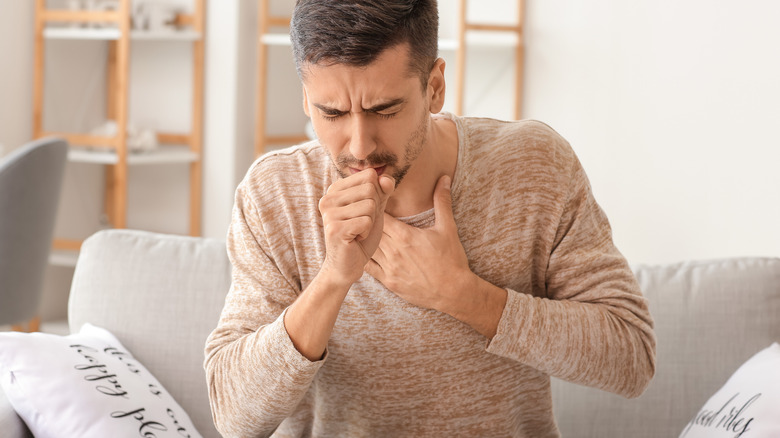Kathy Griffin's Cancer Diagnosis Explained
Kathy Griffin, the controversial actress and comedian, has just revealed in a Twitter post that she has Stage One lung cancer. The two-time Emmy and Grammy winner posted a statement divulging the diagnosis and clarifying that she has never smoked. Griffin writes, "I'm about to go into surgery to have half of my left lung removed," and she goes on to say that the cancer is contained to her left lung and that her doctors have offered a promising prognosis.
Griffin also mentions that they are optimistic she will not need chemotherapy or radiation post surgery, and states "I should be up and running around as usual in a month or less." The comedian states that the diagnosis comes after a "helluva 4 years," which ABC News reports is in reference to the fallout Griffin faced following her controversial photo shoot with a likeness of then-president Donald Trump in 2017. The comedian concluded her statement advising that everyone stay up to date on their health check ups, stating "It'll save your life."
What is lung cancer?
Any cancer that originates in the lungs is considered a lung cancer (via American Cancer Society). Commonly lung cancer begins in the cells that line the bronchi, which are tubes that spread out and enter the lungs via the trachea. Lung cancer can also start in the smaller parts of the bronchi, the bronchioles, or in the tiny sacs at the end of the bronchioles, which are called the alveoli.
Lung cancer is the second most common cancer found in America, right after breast cancer, but lung cancer is the number one cause of cancer-related deaths (via National Cancer Institute). While lung cancer can spread to the lymph nodes, or to other organs in the body, other cancers can also spread to the lungs (via the Centers for Disease Control and Prevention). The American Cancer Society reports that the earlier it is found, the more success medical professionals will have at treating lung cancer. As she stated on her Twitter account, Kathy Griffin's cancer was detected early, which gives her an optimistic prognosis.
There are two types of lung cancer
According to the American Lung Association, there are two types of lung cancer: small cell lung cancer (SCLC) and non-small cell lung cancer (NSCLC), which is more common. Small cell carcinoma and mixed small cell/large cell cancer are the two kinds of SCLC, and this type of cancer is highly linked with cigarette smoking. The American Lung Association reports that chemotherapy is primarily used to treat SCLC.
NSCLC accounts for nearly 80% of lung cancer diagnoses, and spreads more slow than SCLC does. There are three types of NSCLC: adenocarcinoma, usually detected in the outer layer of the lung; squamous cell carcinoma, which is common in the center of the lung by an air tube; and large cell carcinoma, the faster-spreading cancer which can affect any area of the lung. After determining the type of cancer, the doctors must then find out if the cancer has spread and how much is in the body. The American Cancer Society reports that this is the "staging" process, and lung cancer can range from stage 0, the earliest and most treatable stage, to stage four, the most difficult stage to treat. Kathy Griffin has revealed she is currently being treated for stage one lung cancer, and that the cancer does not appear to have spread to other parts of her body.
What causes lung cancer?
Typically, the first thing that comes to mind when you think of lung cancer is smoking, but as Kathy Griffin stated in her announcement, she has never smoked. The American Cancer Society states that, although smoking is the leading factor in developing lung cancer, there are other reasons you might be at risk. Cigarette smoking accounts for up to 80% of lung cancer deaths, and if you are a smoker who has also been exposed to harmful elements like asbestos, the risk factor significantly increases.
According to the Centers for Disease Control and Prevention (CDC), radon exposure is the second leading cause of lung cancer in America. The tasteless, scentless gas is said to be found in high amounts in one out of every 15 homes, and because of this, the Environmental Protection Agency recommends having your house's radon levels tested, and if they are higher than recommended, to have mitigation performed. Other known lung cancer causes include secondhand smoke, air pollution, and diesel exhaust exposure.
Lung cancer symptoms
According to the Mayo Clinic, in the beginning stages of lung cancer, there might be no noticeable symptoms. As the cancer progresses, a new cough might develop, as well as throat hoarseness. WebMD reports that wheezing, persistent chest pain, chronic lung infections like bronchitis, and trouble swallowing can also be symptoms of lung cancer. There are some signs that warrant a doctors visit asap, including coughing up blood, sudden vision problems, or sudden and extreme weakness.
In cases where there are no symptoms, the cancer is sometimes detected via a chest X-ray that may have been ordered for an unrelated reason. If detected this way, the doctor would likely order a CT scan and biopsy to confirm the cancer (via WebMD). Once the cancer is diagnosed, other tests and scans, such as a PET scan, will be ordered to determine if the cancer has spread and which stage it is.
Reducing the risk of lung cancer
Smoking is linked to as many as 90% of lung-cancer-related deaths (via CDC). Not smoking, or quitting a current habit, can greatly reduce your risk of developing the disease. In addition, the CDC advises to avoid secondhand smoke, get your home checked for radon, and try to avoid carcinogens, which are cancer-causing agents. The Mayo Clinic suggests that eating lots of fruits and vegetables, as well as exercising daily, can also help decrease your risk.
It is still unclear how Kathy Griffin's cancer began or how she was diagnosed — all we know at this time is that she claims to have always been a non-smoker, and she is being treated via partial lung removal for stage one lung cancer. She did reveal toward the end of her post that she has been fully vaccinated against COVID-19 and that "the consequences for being unvaccinated would have been even more serious." We wish Griffin all the best during this time.






